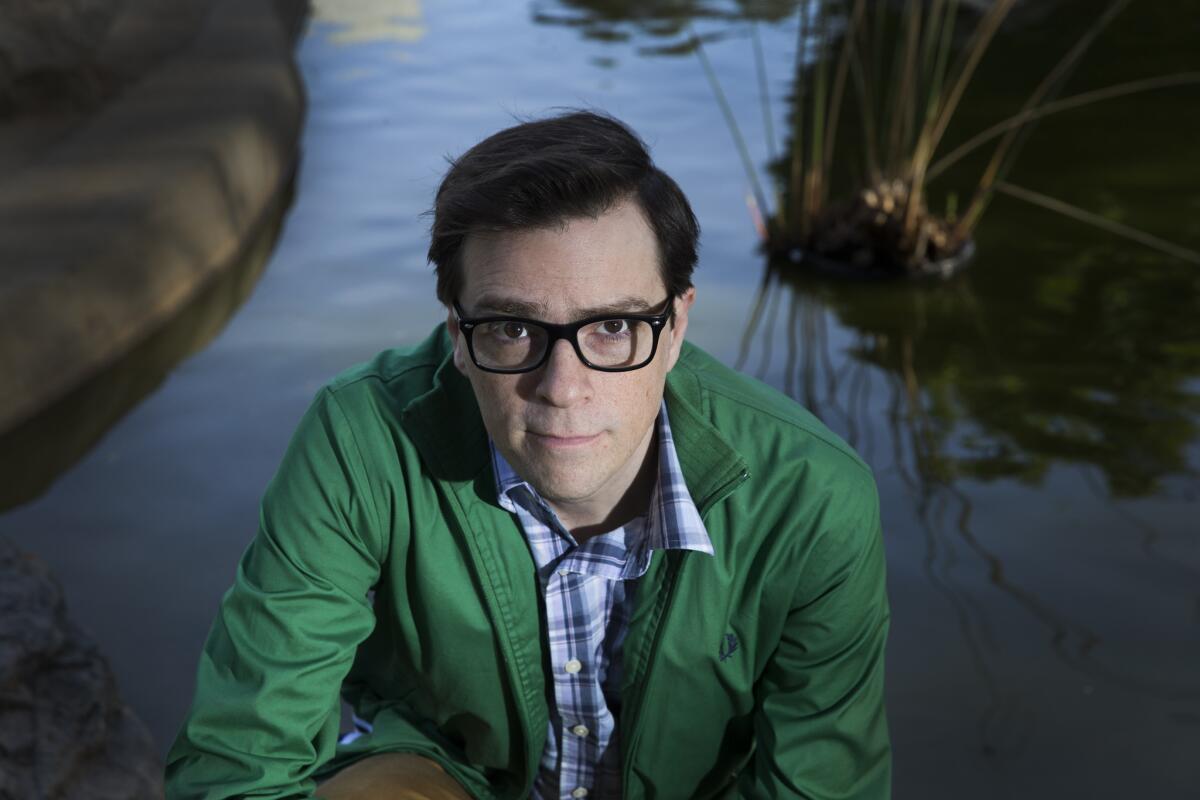Weezer’s Rivers Cuomo is getting ‘comeback’ fatigue

Rivers Cuomo, lead vocalist, lead guitarist and songwriter of Weezer, is photographed at Douglas Park in Santa Monica, on March 14.
- Share via
The girl on the pogo stick arrived as if on cue.
Perched on a park bench near his home in Santa Monica, Rivers Cuomo of Weezer was explaining recently how he drew inspiration for his band’s new self-titled album from observing scenes and characters around the Westside: surfers and Hare Krishnas at Venice Beach, punk kids playing shows, a woman named Maria whom the married frontman met on the dating app Tinder. Just then a girl who looked to be 10 or 11 came bouncing by, her face fixed in an expression of pure, future-Olympic-athlete-level concentration.
See more of Entertainment’s top stories on Facebook >>
“Speak of the devil,” Cuomo said with a little laugh. “Wow, she’s pretty good!”
Weezer broke out in 1994 with an earlier self-titled record, known as the Blue Album, that wrapped Cuomo’s many anxieties in layers of guitar fuzz. Catchy but hard-hitting, the music was clearly connected to the post-grunge sound of the day. Yet the band’s clean-cut style and throwback references — “I look just like Buddy Holly, and you’re Mary Tyler Moore,” Cuomo sang — also made it feel like a reaction against the sneering excess of alternative rock.
“It just seemed like bands had gotten as many tattoos as you could put on a body,” he said, thinking back to that era. “So at that point, what’s left to do but erase it all and start over from a clean slate?”
That contrarian sensibility has driven Cuomo, now 45, through the past two decades. Across Weezer’s nine studio records — including several other self-titled efforts, each referred to by its color scheme — he’s pushed the band’s music in surprising directions (such as when he drafted the rapper Lil Wayne for a cameo on 2009’s “Raditude”), only to reembrace the crisp power pop that made him a star.
For its latest, which the singer calls the White Album, Weezer’s manager suggested the longtime Angelenos write a beach record. “It was one of those things where it’s so obvious that we never even realized it,” Cuomo said.

Yet the result, due April 1, is far from a straight-up ode to swimsuits and suntans. Filled with curious details from his various fact-finding missions, songs like “Do You Wanna Get High?” and “Thank God for Girls” tell a story about California that’s stranger and darker than Weezer’s bright buzz saw guitars suggest.
“I think I’m in whiplash / I’m losing it, mixing ammonia and bleach,” he sings in “L.A. Girlz,” “I get off at Pico and sell my possessions so you will know just how I feel.”
Early singles from the album have set off chatter that Weezer — which also includes guitarist Brian Bell, bassist Scott Shriner and drummer Patrick Wilson — has returned to form, and just in time for a massive summer tour scheduled to stop Aug. 6 at Irvine Meadows Amphitheatre. Then again, that’s what people said about the band’s previous album, “Everything Will Be Alright in the End,” which came out in 2014 to rave reviews but middling sales. (That happened to some degree as well with “Hurley,” from 2010.)
As kids tossed bread crumbs into a nearby duck pond, I talked with the eternally boyish singer, whose only visible concession to age was the slight wrinkling around his eyes. These are excerpts from our conversation:
In the first verse of the new album’s first song, you rhyme “California” with “rigor mortis,” which to my knowledge hadn’t previously been done.
It was the first thing that came to my mind.
The line sort of tells you right away that this isn’t going to be your typical fun-in-the-sun experience. These songs talk vividly about desperate people in a would-be paradise.
I got really into Hemingway — this idea of living life in an extreme way at night, then waking up the next morning and very quietly thinking back on it all and writing it down. Trying to describe what’s out there rather than just describing emotions.
That was unusual for you.
Well, I think a lot of my best lines have some kind of visual detail in them: the fan letter written on the stationery in “Across the Sea” [from 1996’s “Pinkerton”]. Hopefully I wasn’t always just like “I’m sad,” or “I’m horny.” But I got excited and started working with different techniques like cut and paste, which I was never into before. “L.A. Girlz” was written that way, where I had piles of cool-sounding lines from journals or books or things I’ve overheard people say just walking around.
In spite of those new techniques, the White Album is already being talked about as a comeback — which the last one was too.
God, I’m so tired of it.
Why does that keep happening?
I’m very careful in my own messaging never to say, “This sounds like how we used to sound.” I’m always trying to emphasize the new things we’ve tried. But it’s just really hard to get that through. We’d have to make a record that sounds absolutely nothing like anything we’ve done before, and only then would people give us some credit for doing something original. In my defense, within the team that was making this record, I was the voice that was saying, “Let’s do something radical.” And Jake [Sinclair], our producer, was very much the voice of conservatism, on the side of the old-school fans. So he was kind of pulling in the other direction, and I think that tension is what this album is all about. He won on this album, and I’m gonna win on the next album, which is the Black Album.
Is that true?
Yeah. I’ve been working on it for the last six months, and it’s really different.
One bummer about the comeback idea is that it serves to negate what came before, even when what came before was good. And perhaps you help that along, because then you stop playing those songs on the road.
There’s part of me that’s such a defeatist. If a single doesn’t break through and become this big hit song, I’m so quick to throw in the towel and give up. I know how you feel: It seems like such a waste. But then I so quickly get excited about the next thing.
Tell me about Tinder. This had to be a weird experience given that your motives were different from those of other people using the app.
Who knows about motives? It’s all so complicated. I’m certainly still interested in girls in a way that other guys are.
But they’re looking for a date.
Nothing wrong with a date.
You’re saying: Define a date.
Right. I mean, there’s nothing wrong with getting together with people and hanging out. Having experiences. If I’m just sitting at home in my room, I run out of things to write about.
And that fit into the structure of your life as a married guy? A dad? A well-known person?
I like it best when I’m able to meet people who don’t know who I am. Or that somehow have a talent for treating me like they would anybody else.
Were those people easy to find?
It was easy to find people who didn’t know who I was, but it was hard to find people who would match me. But I don’t need a lot of people. If you find the right person, you can get a couple of good songs.
Another thing this makes me think about is that when you were a young man, you were often writing about old-man things.
I’ve felt like an old man since I was a little kid.
Now you’re older and writing about young-man things.
I don’t think it’s as cut and dried as that. I have such respect for the tradition out of which Weezer developed: pop and rock back to the Beach Boys and the Beatles and before. It’s mostly songs about girls and the problems of being a young person, and I don’t want to just drop that. I want to work in that genre.
But being older changes your relationship with those themes. It introduces an element of irony, even a creepy quality.
I think I have some of that Brian Wilson naivete still. Maybe it’s just an ingredient in my recipe, but I know there are moments when I’m speaking as straightforward as he does.
For me the most powerful Weezer songs of the past few years have been the ones with double meanings or maybe submerged meanings.
I can definitely say that I’m trying to create something that I don’t entirely understand. I have an instinct to create these complicated things: a song, a recording, a persona, whatever. And creepiness is part of the desired effect.
One example of this on the new album is “Thank God for Girls,” which is about a guy who goes off to fight dragons and then comes home to a woman who’s there waiting for him with cannoli. The song can be seen as pretty regressive.
I got hit for that by some critics for sure. It’s a problem. I think if I’d seen the reaction before we put the song out, I might have been able to tweak a line, a word, an inflection here or there.
So as to avoid being seen —
I guess maybe to make it more interesting or likable. Or enjoyable for some of the people who reacted negatively for that reason.
You’re not looking to alienate anybody.
I like to take other people’s ideas into consideration. And since this has happened, I’ve been more careful running lyrics by people who might be sensitive to that kind of retrogressive stance. I’ll say, “What do you think about this? Is there something in here that sounds too macho?” Not that I’m worried about being offensive. I just want to be doing stuff that’s new. So if it sounds like something that could’ve been written by a metal band in the ‘80s….
It’s not the only Weezer song open to that critique. You think of “No One Else,” from the Blue Album, about a guy longing for “a girl who will laugh for one else.”
That song gets hit too. Look, I love “Thank God for Girls,” and I think it’s possible that it could’ve been improved by getting some feminist feedback. I don’t want to shut down my inner ugliness. There’s a lot of stream-of-consciousness writing in that song, and the reason you write like that is because you want to dig up this horrible junk, to get it out there and use it. Once you expose it, you can play with it a little bit. You can make it the most interesting and original thing it can be.
MORE:
‘Everything Will Be Alright’ in Weezer’s musical roller coaster ride
Jimmy Kimmel’s secret to his musical mash-ups: ‘I love a good pun’
Review: Burgerama, featuring Weezer, draws the approval of a music festival-hating musician
More to Read
The biggest entertainment stories
Get our big stories about Hollywood, film, television, music, arts, culture and more right in your inbox as soon as they publish.
You may occasionally receive promotional content from the Los Angeles Times.











